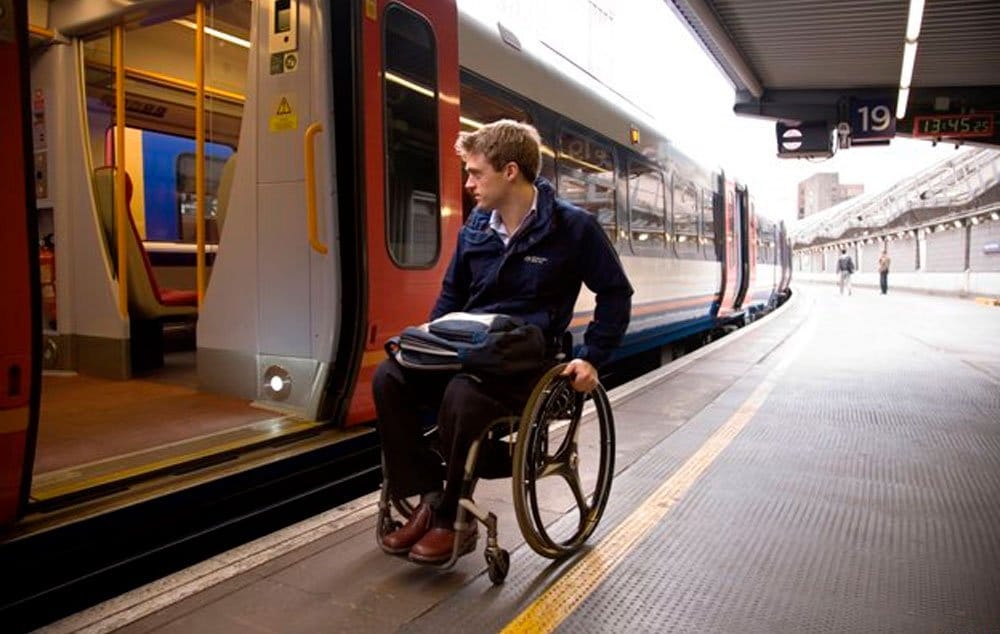“Does the other end know I’m coming?”
This is the line wheelchair-user Baroness Tanni Grey-Thompson repeats time and again to staff on every train journey.
It may sound overzealous but Grey-Thompson says that while it makes for a stressful trip, lots of people who write to her about travel experiences do the same. Many disabled travellers worry that they won’t be met with the help they need at the other end.
“I’ve been left on a train at 01:00, with no ramp to help me off,” she tells this weekend’s 5 live Investigates on BBC Radio 5 live.
The crossbench peer works in London and lives in the Northeast of England. She travels regularly between the two by train, arranging help in advance via Passenger Assist, a specialist booking system for disabled people to reserve seats and arrange extra help at stations.
When no ramp materialised for Grey-Thompson that night, she says, “I had to get out of my chair onto the floor near the toilet, crawl off and push my chair off.”
She goes public when things go wrong, tweeting and writing about her experiences, “to make it better for other people”.
Speaking again of the night she was left stranded, she says, “If I’d been in a situation where I wasn’t as mobile as I am, I’m not sure how long I would have been stuck on that train.”
A report critiquing the Passenger Assist service by the watchdog Passenger Focus says that despite booking help in advance, there was no assistance for their disabled mystery shoppers to help them get off the train in 21% of cases.
The report, which also includes feedback by people with cognitive and visual impairments, highlights issues that are only too real for some disabled travellers. Claire Jones from Leeds, who uses a mobility scooter, recently booked assistance but when no one turned up to help it meant that rather than alight at Birmingham as planned, she was forced to travel on to Cheltenham, 40 miles down the line.
“When you have a disability like mine, which affects your energy levels, there is only a certain amount of time you can sit in a scooter. It determines how much time you can travel.”
Another issue uncovered by the recent investigation into the Passenger Assist Scheme was that disabled travellers were not given all the information they needed about a journey. There were instances where the mystery shoppers who’d been testing the system found that stations were less accessible than they were led to believe.
Wheelchair user Paula Moulton says that on one occasion she’d been made aware that a station’s platforms weren’t accessible via ramp, but decided that she could manage this in her manual chair by careful manoeuvring.
However, a “bizarre surprise” awaited her on arrival. “What they didn’t tell us was that there were two flights of stairs and a bridge to get over to the other side. Some really nice guys picked me up and carried me, which I hate happening, but I hadn’t got an option.”
In the past, lack of information has left Grey-Thompson without an accessible toilet for up to five hours.
“Disabled people are used to making lots of decisions about how they travel,” she says. If given the right information about the loo situation, “you don’t drink for an hour and a half before you get on the train to make sure you don’t need to use the bathroom”.
But what Grey-Thompson says challenges her most is that these “aren’t decisions any non-disabled person has to make”.
Having to book help a day in advance to guarantee assistance is a particular gripe of hers. “Disabled people just want to make decisions to meet a friend for lunch, or to just do something different. We don’t always know 24 hours in advance what time we want to travel.”
A spokesperson for the Department for Transport says, “The Passenger Assist Scheme is a vital service and we expect train operating companies to ensure it is working well. That is why we helped to fund a study into the system, and we will look to the rail industry to take forward any recommendations.”
A spokesperson for the Rail Delivery Group, which speaks on behalf of the industry says:
“We apologise to anyone who hasn’t had the service they expect. The industry has worked hard to improve facilities for disabled passengers which are better now than they’ve ever been with record numbers choosing to travel by train.
“While the UK recently came top of Europe’s seven major railways for accessibility, the industry is always looking to improve and to provide the best experience possible to disabled passengers.”
Minister of State for Transport, Baroness Kramer, says that fining companies for failing to provide assistance is the wrong approach. She says that instead we have to “culturally embed, from the top of the company down to the humblest person that (they) have as much of a duty to serve a disabled person as anybody else.”
Grey-Thompson says that getting assistance right and making trains and stations more accessible is important because “changes to welfare support mean that people who might have had a motability car in the past won’t – so there will be more people taking public transport”.
Source: BBC



